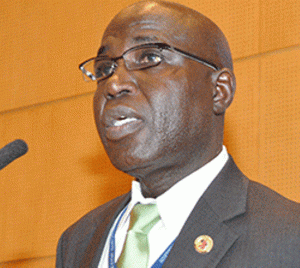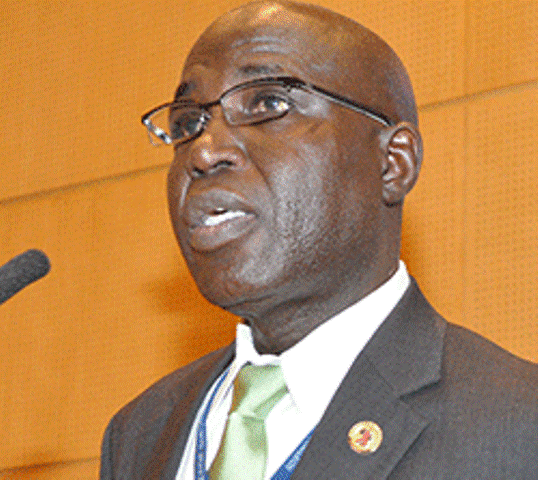
The African Union last weekend adopted the Nigerian Centre for Disease Control, NCDC, as one of its five Regional Collaborating Centres for Disease Control. It is part of the AU’s plans to own functional health institutions that conduct live-saving research, and possess capability of disease detection, surveillance and response, according to leader of the AU team who was in Abuja to assess the NCDC, Amb Olawale Maiyegun, who doubles as Director, Department of Social Affairs of the AU Commission,. Health reporter, Marcus Fatunmole, was there and reports. Excerpts:
Why is AU adopting NCDC?
In 2013, the Heads of States and governments of the African Union at a special summit on HIV, TB and Malaria decided on the need for an African Centre for Disease Control that will conduct live-saving research, that will also have capability of disease detection, surveillance and response. In January 2014, the Assembly also reaffirmed this and asked the African Union Commission to get to work. The Ebola outbreak in West Africa provided the impetus, and the Heads of States, together with the Executive Council decided on the need to fast-track. But, they gave clear instruction to us on the kind or the nature of the Africa CDC that is to be set up. They want an Africa CDC that will not re-invent the wheel, that will build on existing structure, and that will leverage on the existing assets on ground. And, so, in the concept that they approved in January 2015, we are to have a coordinating office inside the African Union headquarters in Addis Ababa, but with five regional collaborating centres. Each bringing certain capabilities and assets and value to the work of the Africa CDC.
What are the criteria for selecting the centres by the AU?
We have to start with the initial five, and will be more than that as the CDC expands. They plan to have what is called centres. And, that is why it is called Africa Centres for Disease Control and Prevention, with the abbreviation Africa CDC. Each regional group is to nominate these regional collaborating centres. And, we’ve received nomination from the five regions of the continent. Central Africa has nominated Gabon; East Africa nominated Kenya; North Africa nominated Egypt; Southern Africa nominated Zambia; and West Africa nominated Nigeria. Our responsibility therefore are the rigorous criteria that have been put into the Africa CDC. We are supposed to go on on-sight visit, whether the institutions being put up by these countries meet the criteria contained in the Article 26 of the Africa CDC. The purpose of our mission therefore is to determine whether the Nigeria CDC, which also doubles as the Regional CDC for West Africa, indeed meet those criteria that is contained in the statute. We are not comparing the countries with each other, we are evaluating and accessing them vis-à-vis the criteria contained in the statute.
Did the Nigerian CDC meet AU requirements?
In terms of findings, as soon as we arrived, we were received by Minister of State who demonstrated clear knowledge of the subject matter. We also got call from the honourable Minister and we were never disappointed with their deep knowledge on the issues, not just because they are medical doctors themselves, but they understand deeply the issue of public health and the reason of our coming. So, we try to do evaluation around the checklist that we put together. But, we can summarize them around four main areas: government commitment, human resources, infrastructure and funding. In all these, we are happy to note that there is strong commitment on the part of the Federal Republic of Nigeria and that was clearly demonstrated by the two Ministers. We’ve seen the legal framework too and the one that is still being put together. We hope that some efforts will be made in the legal framework to reflect the regional dimension of the Nigeria CDC. It is not only a Nigerian CDC, but a regional one for West Africa and a regional collaborating centre for the Africa CDC. We are happy to note that from what we have seen on ground, that indeed Nigeria CDC can take on those responsibilities that are about to be entrusted to it. However, as we look at some of the strength that they are bringing to the table, we find that the human resources are very strong. They have very strong and powerful field epidemiological and collaborative training. It is a huge asset that will help or facilitate the fulfillment of core capacity of international health regulations. We are very happy about this.
What roles could the Nigerian government still play on the centre before and after take-off of the AU’s project?
As I said earlier, we note it is very strong commitment of government, but we hope that this commitment will be encapsulated into proper funding. And, the funding we refer to here is government continuing to meet its obligation to the Nigeria CDC, so that it can function, not for just Africa CDC, but because it is a commitment that government has to the public health of Nigeria. So, we will need more indication of continued funding and that is being translated into strong political commitment being translated into budgetary support and financial allocations.
Did you observe any challenge at the NCDC?
The foundation of any CDC or any public health is strong laboratories. We’ve discussed with our colleagues what needs to be done. What is strongly required is to have a functional tier-level laboratory. We’ve discussed details of this with them, and it is still a gap. We are quite optimistic they will look strongly into this. Also, they have an asset that they can continue to leverage. We’ll discuss it but they will need to bring some other assets within the country, cleaning the EOC that is currently being used for polio, which is a very strong and well-established emergency operation centre dedicated to polio. Government will need to decide on the sustenance of this facility and begin to use it for the larger public health under the CDC. Again, I believe this is conversation that will continue internally. But, with CDC, it is a very strong and powerful asset that Nigeria can put at the disposal of West Africa and the continent as a whole. These are some of the issues that have come up. But, like I said, overall, some of our partners will be here to support Nigeria as they move to correct those gaps that we have identified.
What kind of support would the centre get from AU and partners?
We will support that institution. It is the asset that it has that is making African Union to say we can give you additional responsibilities. We will, as much as possible, cover the cost of additional responsibilities that we will be putting on them.
With this development, is the AU assuring Africans that it could use the centres to tackle diseases headlong?
Every member state has primary responsibility for their health. I said that earlier. That is why we harp on political commitment into health. Until we all have the mindset that investment in health is an investment in economic development. It is not just some esoteric something somewhere. But, as you put in money, and it is judiciously spent, you are investing in economic development. So, each country has primary responsibility. At the continental level, our job, and we’ve demonstrated this in time of Ebola that the continental organization has to be involved in it. For the first time, we were all faced with health-raging humanitarian, and we responded very well. If you don’t understand what I’m saying, in the past when you had humanitarian catastrophe, it resulted in health consequences, whether it is flooding, volcano, it has health consequences. But, with Ebola, the reverse was the case… The good news is that in the same continent when our leaders had in the past demonstrated commitment, things had always happened in health matters. So, HIV/AIDS, once upon a time it was ravaging. The moment the Heads of States, using the platform of African Union and others, came face to face with the reality and they were committed, they went all out. Today, it is on the reverse. Maternal, newborn and death: when we were all lagging behind, up to 2005/2006, we charged the organization to take certain measures which they all rallied round. By 2009, we launched the continental campaign for accelerated reduction of maternal mortality. In 2010 in Kampala, they took it upon themselves. Since then, Heads of States have been strongly committed to tackling maternal, newborn and child health. Today, most of them might not have met the MDGs four and five, but maternal deaths have reduced close to 50 percent on the continent. We are making improvement.
Prev Post

